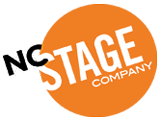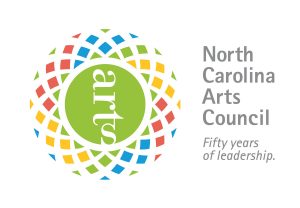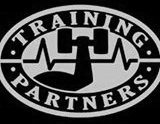Venture behind the scenes with two actors in our current production, Jeeves Saves the Day!
Prefer to read? See the transcript below.
Taylor Beyrer: Hi there! My name is Taylor Beyrer and I am the Audience Relations Manager here at NC Stage. Today I’m sitting down with Charlie Flynn-McIver and Peter Thomasson, who are two of the stars of Jeeves Saves the Day, going on right now at North Carolina Stage Company. Thank you so much for joining me, I’m very excited about this.
Peter Thomasson: My pleasure.
Charlie Flynn-McIver: My pleasure too.
TB: Alright, let’s get started. So, how long have you been working on the Jeeves plays and what’s that like?
CFM: Well this is the fifth one we’ve done and I was involved with all of them. As the artistic director of the theatre, I made the decision to do the plays and I have been in each one of them as well. And they’ve been great. They’re physically demanding. The role that I usually play is the goofy friend of the lead character who has a lot of pratfalls and physical shenanigans that happen, so it’s been fun to do that and very fulfilling just to hear the audience laugh the way they do at this show.
PT: And this is my first go with this wonderful group. Actually, I’ve only seen one of the other productions, which was last year, because I was on the road during all the other productions, out of town. And this was a great honor to be able to join this wonderful group and I’ve had a delightful time. I will say that it’s a fair amount of work, because of timing and – comedy is hard, as they say, but the payoff is great. But I’m having a wonderful time.
TB: So what draws you to this play, either why did you audition or why was it selected? What really brings out the joy in you in this production?
CFM: Well I found out that these Jeeves and Wooster plays existed and told my wife about them, who is the co-founder of North Carolina Stage Company, and she read all the P.G. Wodehouse books when she was a kid and said “there are plays with these characters?! We should do it and I have to direct.” So I’m not one to argue with her in regards to those types of things, so that’s the way that worked out. As we started working on it, I realized that it really reminds me a lot of not just Monty Python but Blackadder, which was a BBC television series in the 80s and 90s. There’s just something about that British dry sense of humor that really kind of brings down the upper class characters a peg or two without them ever knowing it. And it’s usually done by someone who is subservient to them, which is a standard configuration of this type of comedy – I think it’s particularly British. It’s a really exciting experience to just totally give over and go for it for these particular characters. In my circumstance – my characters are ridiculous, and to just really go full tilt into that ridiculousness is a blast. And it’s just something that I really responded to as a kid and young adult watching Monty Python and Blackadder series.
PT: I’d like to say when I was first sent this script, the very first time I read it, I just laughed out loud, I thought it was delightful. And every time I read it after that it was so clearly – the humor was right there on the page. And I think from my perspective as Jeeves, I get to observe the very thing that Charlie’s talking about – the absurdity of the other characters. And that’s kind of fun for me, Peter, to be in that position.
TB: So speaking of characters, how are you similar to or different from the characters that you play in this show?
CFM: Peter, you go first!
PT: Well I’ve been told that I’m very much like my character by those who know and love me best.
TB: In what ways?
PT: Well I think in that sense of being a little formal, reserved. But that doesn’t belie the fact that on the inside I’m a laugh riot. Because I think the character of Jeeves is innately hilarious.
CFM: He gets the most laughs.
PT: Oh my god! He’s very funny, and yet he’s the straight – he’s sort of the formal guy setup here and everybody else gets to play, if you will.
CFM: It’s almost like Jeeves is the stand-in in the play for the audience, who can see everything that’s happening and as Jeeves formulates what’s going on, the audience is sort of seeing it through his eyes.
I relate to my character – I think in my heart of hearts I like to think i’m as silly as my characters, as devil-may-care as the characters I play in the Jeeves plays. I certainly am not that way in my day-to-day life, but in my mind, I am a man child and my characters – I do wish I could be, in my everyday life, more like the characters I play in Jeeves.
TB: And how has this experience of working on a world premiere differed from other projects that you’ve done? And Charlie since you worked on the selection of this play, what was the experience like – how did this play come about?
CFM: So this is the fifth play in the Jeeves series and originally it was a trilogy and then I found out after we had done the third one that there was a fourth one called Jeeves at Sea. And then as we were performing Jeeves at Sea last year, there was such a strong reaction to it from the audiences that I decided to call the playwright up, Margaret Raether, and ask her if she’d be willing to write another one and she said two other theatres had made the same request. That’s how that started. As soon as she finished working on a different play that she’d been working on, she sent me a draft of Jeeves Saves the Day – she actually sent me a treatment, basically a description, and I gave her some feedback. I think one in particular thing I asked – if we could add a character that did this and she said “yeah sure, that sounds great.” They’re all based on Jeeves short stories that are in the public domain so they’re coming from that. So that’s mainly where the text is coming from, but she also has her own innovations in there as well. One of the funniest things in this show is a word association that two of the characters play which is totally Margaret’s invention. So as we’re going along, I read iterations of the script, I give her some feedback, and then as we got into rehearsals, it was great to have the playwright’s ear which you don’t usually have when you’re producing a play that’s already been published. And be able to say to the playwright, you know, maybe ask a question like “we don’t understand why this line is here, can you explain that?” That’ll help us perform it better but also we were able to make some requests like “can we flesh out this moment right here? We feel like we’re missing something.” And she was very accommodating in that.
TB: So then what has the experience of working on a world premiere been like for the two of you?
PT: Well, from my perspective, this being my first go with the Jeeves stories, for me it’s just like going into any other new production, whether it was a world premiere or not. The fact that Charlie would communicate with Margaret was not something that affected me directly outside of his delivering whatever information she passed on. I think, my previous experiences certainly in the early part of my career – generally the playwright with most first time productions, was there on the side so you might be getting re-writes right in the process. Margaret was in Chicago during this process so Charlie communicated with her. But for me it’s just – this play could be a 100 years old and I still have been stepping into it for the first time.
TB: Is there anything else you wish to share about the production or about the process?
CFM: I would just say that it’s really fun and such a joy to be on stage with all these guys, Peter and Scott and John and Callan and Maria, because we’ve all established this sense of trust with each other. I was just doing this event earlier and one guy asked “how do we work out the timing?” He was like “the timing in the play between the characters is so great.” It’s hard for them to describe, all you can say is the timing. And usually that means they’re responding to something that was extremely funny that if you told it in any other different way, it wouldn’t be as funny. So he’s like “how do you do that?” And I’m like “well, you know 50% of it is what you talk about and the rest is the chemistry between the actors and the director.”
PT: And I think the majority of compliments that I’ve heard about the production has to do with that very thing, the timing. And of course to the person who’s not directly involved in this kind of work, it seems simple, but it’s anything but. I mean that is part of the job and it’s part of the work. But I think we have such a gifted cast, everybody comes with a lot of experience and it works. We all work well together. And I must say if there’s a mishap on stage, which the audience never knows about but the actors do, it’s a very comfortable group of people to be with because everybody knows the material really well and we do all work so well together.
TB: Well thank you two for joining me this afternoon. If you want to see Jeeves Saves the Day it is now playing through March 1st here at NC Stage

















